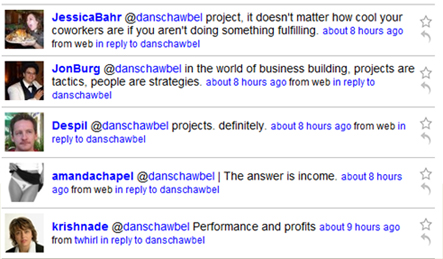The current workplace
We know the future of the workplace is going to be virtual. We have started seeing this already with the mobile web, as well as the cloud and Second Life. The logic is that at the end of the day, companies just want the work done. They don’t care how it gets done, as long as the output is of high quality and delivered in a timely manner (deadlines). The workplace is filled with legacy channels, operations, tools and a hierarchy that has lasted since before I was even born.
The economy is a bullet into the workplace and the only healing is to soothe employees wounds by giving them flexibility. In a survey of 539 U.S. workers, 44% of respondents said higher gas prices have affected their commutes, up from 34% two years ago when a similar survey was conducted. 44% of those respondents who have altered their work arrangements. One-third said they are driving a more fuel-efficient vehicle. In addition, 33% said they are telecommuting more frequently. Where you get work done is less important these days, than if the work gets done.
People won’t be asking “why do you work remotely” 3 years from now. Instead, they will scratch their head as to why someone wouldn’t work remotely.
People
In order to complete projects, you need people. People are the most expensive assets in a company. The utilization of human assets is important with project management and the overall success and completion of a project. When projects aren’t finished on time, people tend to get fired, especially if it’s a high profile project that affects the bottom line or impacts the end user (customer).

Within the “people matrix”, you have connections and relationships that sway the emotions, attitudes and way of approaching and managing a project. Depending on the project goals, an assortment of people are attached to it and are subject to completing it on time. When a single person is tasked with an entire project, he or she almost becomes the project.
Projects
To many, the end result of a project is all they care about. Executives within a company aren’t concerned as much with who it gets done, as long as it does. The end of a project, typically means the start of another. Projects solve problems or create problems, depending on people and external factors. A project is usually measured based on a variety of factors. Some projects don’t finish because of other priorities that surface.
Personal brand vs corporate brand
“It’s all about who you know” – just about every parent in the world. While the company may be entirely focused on driving revenues and cuttings costs for the corporation, the individual cares about building relationships with teammates. People also care about how the results of a project might entitle them to be promoted at work. It might just turn out to be another line in a resume. If you think about your latest project, do you care more about the people you are working with or the outcome of the project? In my opinion you need both. Collaboration builds stronger rapport and projects are great resume builders.
Twitter responses
Thank you for your responeses @JessicaBahr, @JonBurg, @Despil, @Amandachapel and @krishnade. Before you write your next blog post, poll your Twitter followers to assess your ideas. For this post, I surveyed my followers and received five answers. Jessica values projects over people, while Jon sees them both as having different purposes. Despil agrees with Jessica and both Amanda and Krishna value income/profits. If you would like to follow me on Twitter, my address is @DanSchawbel and maybe you will get one of these opportunities in the future. When you register your username on Twitter, try and keep it to your full name for personal branding purposes.













